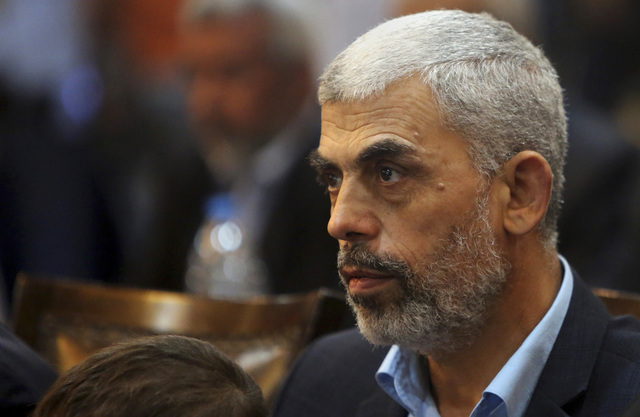September 01, 2017

Hamas’ new leader in the Gaza Strip said Monday his group has completely repaired relations with Iran after a five-year rift and is using its newfound financial aid to regain its strength.
Iran was once the top backer of Hamas, an Islamic militant group that seeks Israel’s destruction. But Hamas broke with Iran in 2012 after the group refused to support Iran’s close ally, Syrian President Bashar Assad, in the Syrian civil war.
During a four-hour meeting with journalists, the group’s new leader, Yehiyeh Sinwar said those ties have been restored and are stronger than ever.
“Today, the relationship with Iran is excellent, or very excellent,” Sinwar said. He added that the Islamic Republic is “the largest backer financially and militarily” to Hamas’ military wing.
It was the first time that Sinwar had met reporters since he was elected in February. The 55-year-old spent two decades in Israeli prisons after being convicted of masterminding the abduction and killing of two Israeli soldiers.
Sinwar would not say how much aid Iran provides his group. Before the 2012 breakup, Iran provided an estimated $50 million a month to Hamas.
Iran has not yet said anything about renewed ties with Hamas. Hamas delegations have visited Tehran in recent months and it was widely assumed there were efforts to resume the alliance. A big unanswered question is what concessions were made.
Hamas wrested control of Gaza from the Palestinian Authority in 2007. Since then, it has fought three brief wars with Israel. Hamas has killed hundreds of Israelis in suicide bombings, shootings and other attacks. It is considered a terrorist group by Israel, the United States and the European Union.
Sinwar stressed that the Iranian aid is for “rebuilding and accumulating” Hamas’ military powers for a larger fight against Israel that is meant to “liberate Palestine.”
“Thousands of people work every day to make rockets, [dig] tunnels and train frogmen,” he said. “The relationship with Iran is in this context.”
But the shadowy leader said his movement does not intend to start a fourth war with Israel, instead preferring to remedy dire living conditions in the impoverished coastal enclave.
Israel and Egypt imposed a blockade on Gaza after the Hamas takeover a decade ago. Trying to pressure Hamas and regain control, Abbas has asked Israel to reduce electricity supplies to Gaza, and he has slashed the salaries of thousands of his former government employees there.
The result is that Gaza suffers acute power outages of up to 16 hours a day, unemployment of nearly 50 percent and widespread poverty.
Sinwar has turned to Egypt, which has begun to ease the blockade as it seeks Hamas’ help in controlling their border. The Egyptian military has been fighting an Islamic insurgency in the Sinai desert, near Gaza.
Egypt had turned its back on Hamas after the Egyptian military ousted the Muslim Brotherhood elected government because Hamas is ideologically aligned with the Muslim Brotherhood.
Relations with Cairo “have improved dramatically,” Sinwar said. Egypt has recently sent fuel to ease the power crisis in response to Hamas’ building of a buffer zone along the border.
“We will knock on all the doors, except that of the [Israeli] occupation, to resolve the problems,” he said.
Sinwar was among more than 1,000 Palestinians released by Israel in 2011 in exchange for an Israeli soldier, Gilad Schalit, whom Hamas kidnapped in 2006.
Sinwar said there would be no new talks over a prisoner swap until Israel frees 54 prisoners released in the Schalit swap who have been re-arrested.
“We are ready to start negotiations through a mediator, but only when the table is cleaned. Freed prisoners must feel they are immune.”